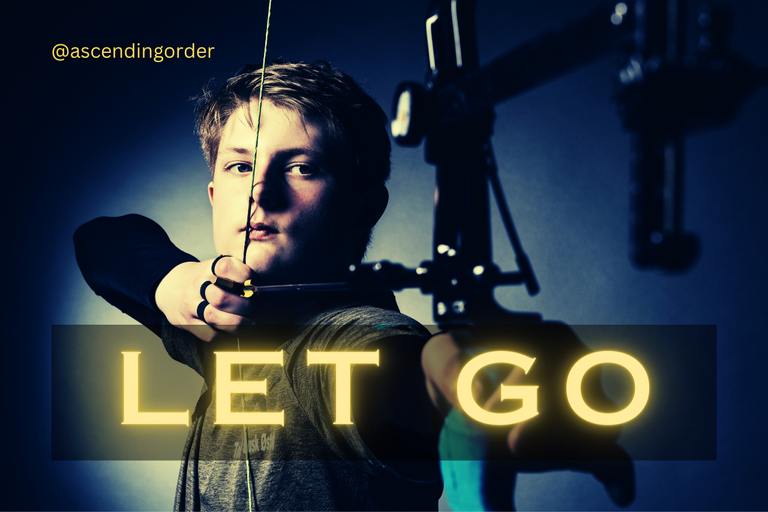GAME OF STOICS # 2: Eight Tips To Help You Let Go

Image by qve68ftc: Edited by @ascendingorder
The essence of Stoicism is focusing on what you can control and letting go of what you can't. You might ask yourself, what is it you have control of? You can control your perception and choices, and that's about it. This might sound limiting; however, when you understand that these things are not bound to the environment, you will transcend your situation.
You may be wondering what this has to do with sports. Sports, especially team sports, require trust. When a footballer punts the ball to their teammate, they have zero control over what their teammate will do with the ball. They in essence surrendered their control to the universe. This idea is deeply rooted in Stoicism. Stoics used the example of the archer. An archer can hold the bow, aim, and draw the string back with perfect technique. But once they release the arrow, it is in God’s hands. If the archer is overly concerned about where the arrow lands, they might make a mistake in their technique. This is because they’ve lost sight of what they can control.
I have a personal experience to share about this. During my training in the military, I encountered a pivotal moment that transformed my shooting skills. Frustration loomed as I repeatedly missed my target, casting doubt on my abilities. It was then that the range master intervened with a valuable lesson that could’ve been taken from a book on Stoic philosophy.
Rather than fixating on hitting the target, the range master urged me to shift my focus inward. He emphasized the importance of controlling my grip, trigger squeeze, and breath. It was a simple yet profound shift in perspective. Instead of letting the pressure of hitting the mark consume me, I concentrated on the elements I could manage and began to shoot with more accuracy.
If you feel like you’ve lost control of a situation, realize that whatever control you thought you had was probably an illusion. Return your attention to yourself. Get control of the dialogue in your head. Let go of what you can’t control, and you’ll start to feel a sense of empowerment again.
If you were locked away in a prison cell, or worse, chained to a wall, you could still control your perception of the situation. There is an incredible true story about this. Nelson Mandela, the former leader of South Africa, was imprisoned for 27 years. Mandela recalled the harshness of prison life in his autobiography. Mandela, a former boxer, lawyer, and leader of the anti-apartheid movement, was jailed as a political prisoner. Eighteen of his prison years were spent at Robben Island, South Africa’s version of Alcatraz. He labored every day at a limestone quarry, where he broke rocks. The extreme brightness of the quarry damaged his eyes because he and the other prisoners were not allowed to wear eye protection. When he was finally freed, he was old and frail, his body broken by years of hard labor. Despite this, his spirit was as strong as ever.
When asked about what he thought about his time in prison, he thought of it as an education:
Prison is itself a tremendous education in the need for patience and perseverance. It is, above all, a test of one’s commitment...
This shouldn’t diminish the immense pain and sadness he experienced in prison. Mandela’s mother and son passed away while he was at Robben Island. He missed out on being a father to his children and a husband to his wife. Despite the tremendous pain and sadness he felt, Nelson Mandela harnessed the things he could control – his positivity and will - to forge an unbreakable spirit. After his release, he used that spirit to change South Africa and the world.
Eight tips to help you let go of what you can't control
1. Know what you can change: Figure out what parts of a situation you can control and what you can't.
2. Stay in the now: Focus on what's happening right now instead of worrying about the future.
3. Think about what you can do: Pay attention to the actions you can take instead of stressing about outcomes you can't change.
4. Understand and accept: Get that some things are just not in your control, and being okay with that can make you feel better.
5. See challenges as opportunities: Look at tough times as chances to learn and grow, not just problems to solve.
6. Set goals you can reach: Make goals that you can actually achieve. Reaching beyond your grasp is a sure way to stress yourself out.
7. Talk to others: Share your worries with friends or family to get different ideas and help you think about things in a new way.
8. Say positive things to yourself: Be an ally to yourself by using positive self-talk.
If You Enjoyed This Post Please Upvote and Leave a Comment

Ascending Order Graphic: Created in Canva: Designed by @ascendingorder
Congratulations @ascendingorder! You have completed the following achievement on the Hive blockchain And have been rewarded with New badge(s)
Your next target is to reach 9000 upvotes.
You can view your badges on your board and compare yourself to others in the Ranking
If you no longer want to receive notifications, reply to this comment with the word
STOP